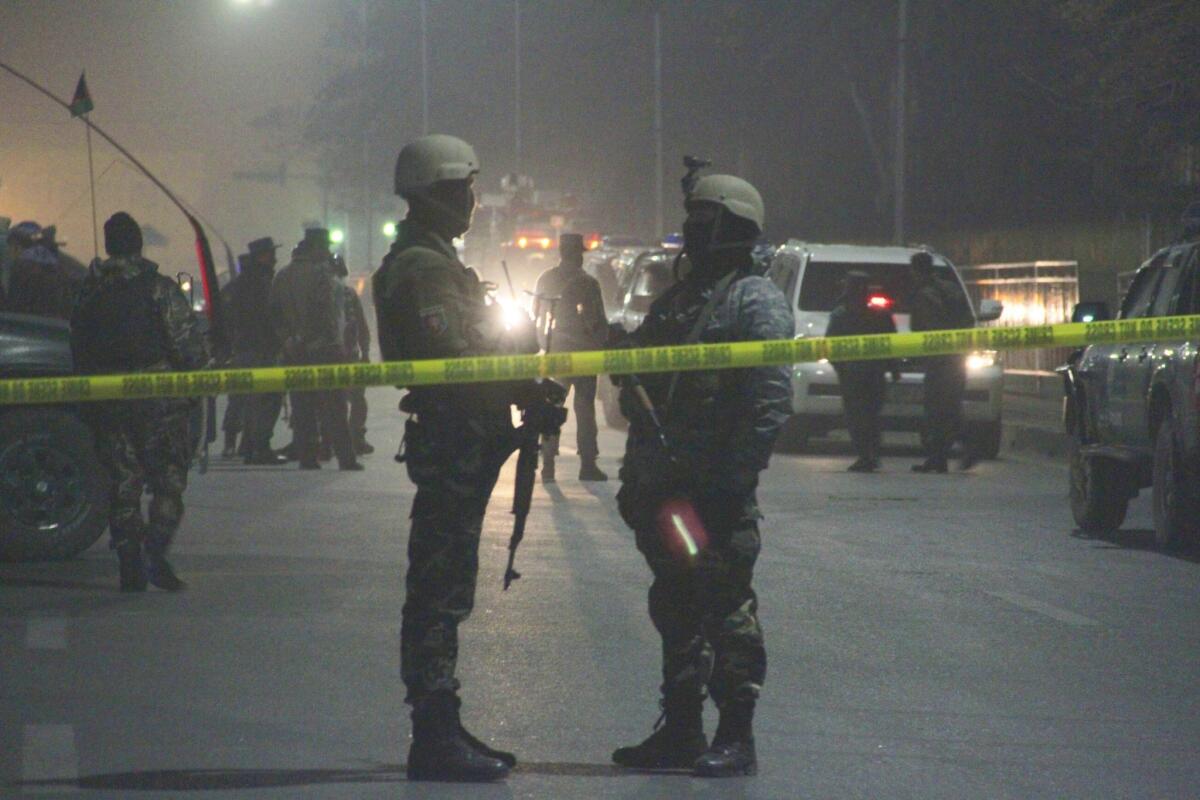Afghan students in limbo after closure of school once funded by U.S.

- Share via
Reporting from Kabul, Afghanistan — When he enrolled five years ago in the International School of Kabul, Faisal Yousufi, now 18, thought he had a bright future. Raised solely by his mother after his father died nine years ago, Yousufi knew he was fortunate to be studying at an institution also attended by the nieces and nephews of Afghanistan’s last two presidents.
All that changed with an email on Jan. 22. The school informed 11th-grader Yousufi and its nearly 400 other students that it would be closed “until further notice” because of an unspecified security threat.
The kindergarten-through-12th-grade institution known as ISK was the only one in Afghanistan providing instruction entirely in English. Its closure means that students like Yousufi suddenly find themselves with few prospects for education in their country, where the public school system is run almost entirely in Pashto and Dari, languages they speak but have not studied in.
“There is no choice in Afghanistan remaining for us,” Yousufi said.
The students come from what has been touted as Afghanistan’s new middle class. But unlike classmates who are from the relatively well-to-do families of leading Afghan government officials and foreign diplomats and who could transfer to schools in Turkey, India, the United States or other countries, Yousufi was on a scholarship that paid the bulk of his $14,400 annual tuition.
Finances aren’t the only hurdle that scholarship students have to surmount. The school closure came too late in the academic year for students to submit applications to other schools, sort out travel visas, seek to transfer credits or overcome family objections to traveling alone to another country to study.
The school’s email acknowledged that “the timing on this decision may not be convenient for anyone.” School administrators did not respond to requests for comment.
“There was no Plan B. You have to show the students a way to make their way through,” said Ikram Wardak, who graduated from the school two years ago and whose brother and cousin were enrolled there at the time of the closure.
Like many students present and past, Wardak questions the school’s decision. The security situation in Kabul was worse when he attended, Wardak said, with gunfire sometimes erupting outside the grounds and the campus going into lockdown.
Nearly two dozen private guards were stationed throughout the west Kabul campus, and students were subjected to several rounds of searches as they entered.
Eleventh-grader Zobair Ahmadi, 18, said students were given a month off during last year’s drawn-out presidential election because of security concerns. This time, instead of shutting down, he said, administrators should have had students continue their class work from home.
“Why couldn’t they just give us two months off and have us study at home and submit work online?” Ahmadi said. “This excuse of security doesn’t make sense.”
The U.S. Agency for International Development provided funding for the school from its founding in 2005 until 2014, when it sought to reduce the number of projects it manages. Some students see a connection between waning U.S. largesse and the decision to close the school. Students said the school hasn’t returned their annual fees, ranging from $5,000 to $12,000.
In a Facebook post, Wardak accused the school of abandoning its students while looking out for its faculty members, many of whom are from the United States or other countries.
“No longer proud to have attended such an institution that put their faculty’s (Americans) well-being before their ‘beloved’ students,” he wrote. “Please don’t come back!!! We’ll manage to make do without ISK.”
In their email, school officials referred to the December attack by the Pakistani Taliban on an army-run school in Peshawar, Pakistan, that left 132 children and 16 staff members dead, saying the incident “has us particularly concerned.”
The Afghan Taliban claimed responsibility for a suicide bombing at a French-language public high school in Kabul days before the Peshawar attack, but the group has not typically targeted educational institutions. The Taliban said its target in the Dec. 11 bombing, which left two dead and 20 wounded, was a play about suicide bombings that was being staged at the school.
Advances in the education system have proved to be one of the major accomplishments since a U.S.-led military invasion ousted the Taliban in 2001, with 10.5 million children enrolled in schools in 2013, up from 1 million in the Taliban era. The international school, where 38% of the students were female, was often held up as an example of progress.
Yousufi had expected to spend this semester preparing to apply to college. Instead, the closure has left him in limbo.
“I don’t know what to do now,” Yousufi said. “I can’t study in Afghanistan, but going elsewhere could also mean losing at least a year of my education if not the chance to graduate.”
Latifi is a special correspondent.
More to Read
Sign up for Essential California
The most important California stories and recommendations in your inbox every morning.
You may occasionally receive promotional content from the Los Angeles Times.












